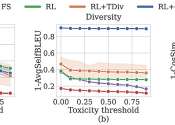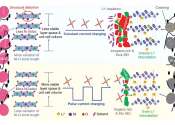Bumpy ride for electric cars in Europe
Electric cars are a key part of Europe's green transition plans but the road ahead remains littered with obstacles with 10 years to go before a crucial milestone.
Apr 11, 2024
0
1
Energy & Green Tech

Electric cars are a key part of Europe's green transition plans but the road ahead remains littered with obstacles with 10 years to go before a crucial milestone.
Apr 11, 2024
0
1
Security

A user could ask ChatGPT to write a computer program or summarize an article, and the AI chatbot would likely be able to generate useful code or write a cogent synopsis. However, someone could also ask for instructions to ...
Apr 10, 2024
0
34
Energy & Green Tech

Oxide ion conductors used in solid-state fuel cells often fail to reach full potential when operating at temperatures below 500 oC, but researchers from Tokyo Tech have recently found a solution to this problem. They demonstrated ...
Apr 10, 2024
0
10
Engineering

An improved charging protocol might help lithium-ion batteries to last much longer. Charging with a high-frequency pulsed current reduces aging effects, an international team demonstrated. The study was led by Philipp Adelhelm ...
Apr 9, 2024
0
38
Business

On 24 February 2022, the Russian army entered Ukraine, escalating a conflict that had begun almost a decade earlier. On the same day, the European Council held an urgent meeting to respond to the aggression and to study emergency ...
Apr 9, 2024
0
7
Automotive

GM subsidiary Cruise on Tuesday said it plans to get its self-driving cars back on the road without human drivers after suspending robotaxi service late last year due to safety concerns.
Apr 9, 2024
0
1
Engineering

The Compression-Absorption Cascade Refrigeration Cycle (CACRC) system, merging Vapor-Compression Refrigeration (VCR) with Absorption Refrigeration Cycle (ARC), presents a promising answer to the pressing energy demands and ...
Apr 8, 2024
0
3
Energy & Green Tech

Researchers at ICFO have fabricated a new four-terminal organic solar cell with a tandem configuration with a 16.94% power conversion efficiency (PCE). The new device is composed by a highly transparent front cell that incorporates ...
Apr 8, 2024
0
5
Engineering

If you've looked in your utility drawer lately, you may have noticed the various shapes, sizes and types of batteries that power your electronic devices. First, there are the round, non-rechargeable button cells for your ...
Apr 8, 2024
0
23
Business

The Taiwan chip giant TSMC has agreed to build a third semiconductor factory in Arizona, raising its total investment in the United States to $65 billion, US officials said Monday.
Apr 8, 2024
0
9
Electricity (from the New Latin ēlectricus, "amber-like"[a]) is a general term that encompasses a variety of phenomena resulting from the presence and flow of electric charge. These include many easily recognizable phenomena, such as lightning and static electricity, but in addition, less familiar concepts, such as the electromagnetic field and electromagnetic induction.
In general usage, the word 'electricity' is adequate to refer to a number of physical effects. However, in scientific usage, the term is vague, and these related, but distinct, concepts are better identified by more precise terms:
Electrical phenomena have been studied since antiquity, though advances in the science were not made until the seventeenth and eighteenth centuries. Practical applications for electricity however remained few, and it would not be until the late nineteenth century that engineers were able to put it to industrial and residential use. The rapid expansion in electrical technology at this time transformed industry and society. Electricity's extraordinary versatility as a source of energy means it can be put to an almost limitless set of applications which include transport, heating, lighting, communications, and computation. The backbone of modern industrial society is, and for the foreseeable future can be expected to remain, the use of electrical power.
This text uses material from Wikipedia, licensed under CC BY-SA